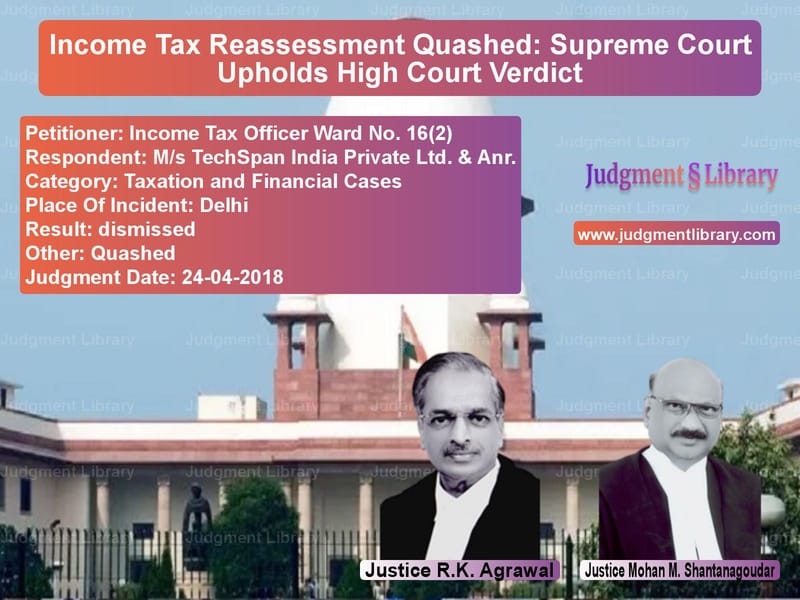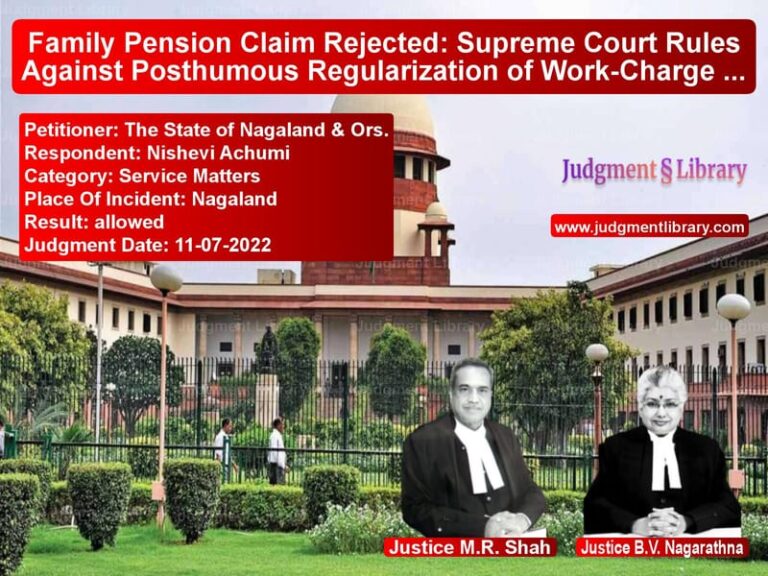Income Tax Reassessment Quashed: Supreme Court Upholds High Court Verdict
The taxation system in India is based on self-assessment, followed by scrutiny by the tax authorities. However, sometimes, the income tax department may reassess an individual or company’s tax liability if it suspects income has escaped assessment. One such case, Income Tax Officer Ward No. 16(2) vs. M/s TechSpan India Private Ltd. & Anr., reached the Supreme Court after the Delhi High Court quashed a reassessment notice issued by the income tax authorities. The Supreme Court upheld the High Court’s decision, ruling that reassessment based on a mere change of opinion is not legally permissible.
The appeal was filed against the judgment dated February 24, 2006, delivered by the High Court of Delhi, which quashed the notice issued under Section 148 of the Income Tax Act, 1961. The Supreme Court, in its ruling on April 24, 2018, reaffirmed that reassessment cannot be conducted on the basis of a change in opinion.
Background of the Case
The case revolves around M/s TechSpan India Private Ltd., a company engaged in software development and human resource services. The company filed its tax return for the Assessment Year 2001-02, declaring a loss of Rs. 3,31,301. During the tax assessment process:
- The company declared income from software development and human resource development.
- It claimed deduction under Section 10A of the Income Tax Act for income earned from software exports.
- The company also claimed common expenses for both business activities.
Following scrutiny under Section 143(3), a notice was issued to the company questioning the allocation of common expenses between the two business activities. The assessment was finalized, determining an income of Rs. 31,63,570, which was set off against brought-forward losses, resulting in a net taxable income of zero.
Income Tax Reassessment Notice
Despite the completion of the assessment, the income tax department issued a notice under Section 148 on February 10, 2005, stating that the company had been granted excess deductions under Section 10A, leading to an escaped assessment of Rs. 57,36,811. The company filed objections, arguing that the reassessment was unjustified, but these objections were rejected on August 17, 2005.
The company challenged the reassessment in the Delhi High Court, which ruled in its favor, quashing the reassessment order. The income tax department then appealed to the Supreme Court.
Key Legal Issues
The key issue before the Supreme Court was:
- Whether the reassessment proceedings initiated under Section 147 of the Income Tax Act were valid.
Arguments by Both Parties
Petitioner’s Argument (Income Tax Officer):
- The Assessing Officer had sufficient grounds to believe that income had escaped assessment.
- The deduction under Section 10A was incorrectly allowed in excess, leading to the reassessment notice.
- The High Court erred in ruling that the reassessment was invalid.
Respondent’s Argument (M/s TechSpan India Pvt. Ltd.):
- The reassessment notice was issued based on the same facts that had already been considered during the original assessment.
- The Assessing Officer’s actions amounted to a mere change of opinion, which is not a valid ground for reassessment.
- The High Court correctly quashed the reassessment as it violated established legal principles.
Supreme Court’s Observations
The Supreme Court, led by Justices R.K. Agrawal and Mohan M. Shantanagoudar, upheld the High Court’s ruling, stating:
“The use of the words ‘reason to believe’ in Section 147 has to be interpreted schematically as a liberal interpretation would have the consequence of conferring arbitrary powers on the assessing officer.”
The Court further held:
“Section 147 does not allow reassessment of income merely because the assessing officer has a change of opinion on the same facts and circumstances.”
The Supreme Court emphasized the distinction between the power to reassess and the power to review, stating:
“The Assessing Officer has the power to reassess but not to review an already concluded assessment.”
Judicial Precedents Considered
The Court relied on the landmark judgment in Commissioner of Income Tax, Delhi vs. Kelvinator of India Ltd. (2010) 320 ITR 561 (SC), which stated:
“One must treat the concept of ‘change of opinion’ as an in-built test to check abuse of power by the Assessing Officer. After April 1, 1989, an Assessing Officer has the power to reopen an assessment only if there is tangible material that leads to the conclusion that there is escapement of income.”
Final Verdict
The Supreme Court ruled in favor of M/s TechSpan India Private Ltd. and dismissed the appeal filed by the income tax department. The Court affirmed that:
- The reassessment proceedings initiated under Section 147 were not justified.
- The notice under Section 148 was based on a mere change of opinion and was therefore invalid.
- The High Court’s decision to quash the reassessment was legally sound.
Conclusion
This judgment reinforces the principle that the power to reassess under Section 147 of the Income Tax Act cannot be used arbitrarily. Tax authorities must have tangible evidence to justify reassessment and cannot reopen assessments simply because of a change in opinion.
The ruling provides relief to taxpayers, ensuring that once an assessment is finalized, it cannot be reopened unless there is valid new information justifying such action. It also underscores the judiciary’s role in preventing excessive and arbitrary reassessment actions by tax authorities.
Petitioner Name: Income Tax Officer Ward No. 16(2).Respondent Name: M/s TechSpan India Private Ltd. & Anr..Judgment By: Justice R.K. Agrawal, Justice Mohan M. Shantanagoudar.Place Of Incident: Delhi.Judgment Date: 24-04-2018.
Don’t miss out on the full details! Download the complete judgment in PDF format below and gain valuable insights instantly!
Download Judgment: Income Tax Officer W vs Ms TechSpan India P Supreme Court of India Judgment Dated 24-04-2018.pdf
Direct Downlaod Judgment: Direct downlaod this Judgment
See all petitions in Income Tax Disputes
See all petitions in Tax Refund Disputes
See all petitions in Tax Evasion Cases
See all petitions in Judgment by R K Agrawal
See all petitions in Judgment by Mohan M. Shantanagoudar
See all petitions in dismissed
See all petitions in Quashed
See all petitions in supreme court of India judgments April 2018
See all petitions in 2018 judgments
See all posts in Taxation and Financial Cases Category
See all allowed petitions in Taxation and Financial Cases Category
See all Dismissed petitions in Taxation and Financial Cases Category
See all partially allowed petitions in Taxation and Financial Cases Category







